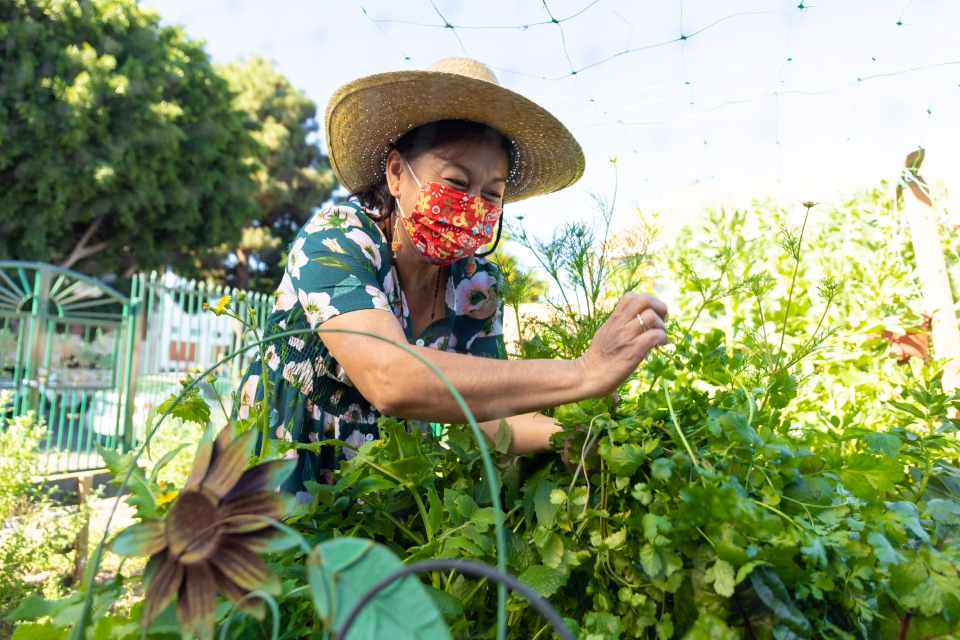
Earth Day was on Friday, April 22. This is a time of reflection about our role in the planet. How can we overcome oppression, turn back from further climate injustice, and build a world that is more sustainable, just, and peaceful? A key element of a just world is climate justice. Check out these videos for more on how we have worked for climate justice in community-centric ways around the globe.
With deep appreciation,
Tonya Histand
Director of Public Engagement
Alumni News & Notes:
After World War II, Lucretia Evans moved from St. Louis to Philadelphia to work for AFSC before traveling to Finland and Germany, where she worked in post-WWII reconstruction. On January 13 Lucretia passed away just after turning 101.
In 1964, Charles Joyner participated in AFSC's southern student project, which placed southern Black students in the north to complete high school and live with host families. Today he is the Artist in Residence at the Westport Library and recently opened a new show there.
Gwendolyn Zoharah Simmons is featured in a new documentary, “Training for Freedom,” about the training of participants in Mississippi Freedom Summer.
John Korty worked in the AFSC audio-visual department in the early 1960s. While there, he produced “Language of Faces” for AFSC, which he later called his most personal film. John, who died in March, was best known for a series of ambitious television movies that examined racism, disability, and other social issues.
Since 1983 Greg Coleridge worked as the director of AFSC Northeast Ohio. Greg recently published a book, “The Depth of Change,” featuring selected writings on social change.
Joan Hammerly Tjossem and her husband, Wilmer, were long-time AFSC staff moving as the job demanded from Des Moines to Denver to Philadelphia. Joan passed away on Dec. 26, shortly after her 100th birthday.
Do you have news to share? Email us today!
Updates from AFSC:
Our North Star: A vision for community safety beyond prisons and policing
Today over 1.8 million people are locked away in the U.S., more per capita than any other country. But we still have high rates of violence. It’s time to do something different. AFSC has identified seven guideposts on the path toward abolition. Together, they light the way forward, serving as our “North Star.”
AFSC today: 100 years in West Virginia
In 1922, coal operators used hunger, evictions, and intimidation to keep miners down. After an uprising, Quakers and AFSC started a program to help feed about 400 children a day in mining communities. Learn how that program grew & how communities are organizing today.
Bonnie Kerness celebrates 50 years
Bonnie Kerness started her 50-year journey at AFSC as a young tenant organizer in Elizabeth, NJ. Now, 50 years later, we recognize and celebrate the profound impact Bonnie has had on our work, and on our lives. Read more here.
Archive Dive:
Trayce K’Meyer, a history professor at the University of Louisville, recently published To Live Peaceably Together: The American Friends Service Committee’s Campaign for Open Housing. The book looks at how AFSC worked to integrate housing in U.S. cities using detailed stories of AFSC activists and their work in Chicago, Philadelphia, and Richmond, California.
More ways to take action and connect with AFSC:
- Take action to reopen our borders to asylum seeks now!
- Watch recorded sessions from the virtual 2022 Corporation gathering.
- New! Find local events on our events page.
- Are you interested in receiving life income while supporting AFSC? A gift annuity is easy to arrange. Reach out to GiftPlanning@afsc.org or visit us online.
Thank you for reading our AFSC Alumni Newsletter! To learn more about our Alumni Network and connect with former friends and colleagues, visit our webpage and Facebook group. You can also email me your questions and suggestions.